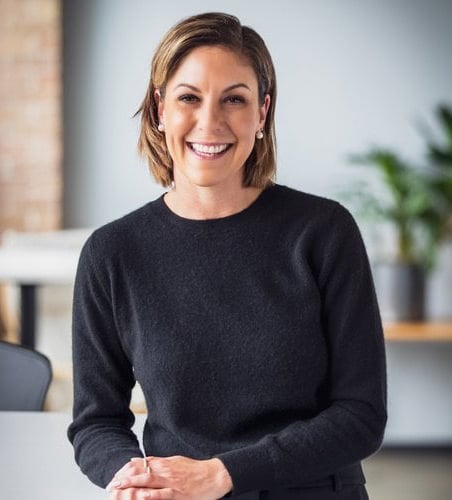July 17, 2024
ALEXA JAMES
MEMBER, CIVIC FEDERATION BOARD OF DIRECTORS
Number of years with the Federation: 1
Committees: Criminal Justice
Day job: Chief Executive Officer, NAMI Chicago
Since stepping into her position as NAMI Chicago's leader in 2014, Alexa James has dedicated herself to making NAMI Chicago a leading voice in the conversation around mental wellness, the challenges of the mental health system, and mental health education in Chicago and beyond. Prior to her work at NAMI Chicago, Alexa worked with children and adults living with mental health conditions as well as those impacted by poverty and trauma. Alexa earned a Bachelor’s Degree in Psychology and a Master’s Degree in Social Work from Loyola University, as well as a Master’s Degree in Child Development from Erickson Institute. She is a Licensed Clinical Social Worker in the state of Illinois.
Under Alexa’s leadership, NAMI Chicago has built partnerships extending throughout Chicago and Illinois that strengthen our community’s response to mental health. She has represented NAMI Chicago on the Police Accountability Task Force under Mayor Rahm Emanuel, the COVID-19 Recovery Task Force under Mayor Lori Lightfoot, and Mayor-elect Lightfoot’s Health & Human Services Transition Committee. Through personal outreach and numerous appearances on local media, Alexa has grown NAMI Chicago’s presence in the community, which has built the foundation for unprecedented organizational growth, particularly expanding NAMI Chicago’s Helpline, peer support, and training and education services.
NAMI Chicago’s message is at the heart of Alexa’s leadership: that with courage and hope, we can bring healing to those who are overlooked in our mental health system, and in our society.
You serve as chief executive officer of NAMI Chicago, one of over 700 state organizations that make up the National Alliance on Mental Illness. How does NAMI support mental health in Chicago?
There are over 600 affiliates within the National Alliance on Mental Illness, but we have 700 organizations identified within our referral database for our Helpline and 988. NAMI Chicago educates to fight stigma and discrimination, fiercely advocates for our community, and shares hope, connection, and expertise with people on their mental health journey. NAMI Chicago connects people with mental health wellness, prevention and recovery services in the city of Chicago and surrounding communities, serving 23,964 people in our fiscal year ending June 30, 2023. We strategically focus our program and outreach efforts toward communities and populations with increased risk factors, higher rates of mental distress and limited access to mental health resources.
When it comes to mental health issues and treatment in Chicago specifically, what do you see as being the greatest challenges and opportunities?
Systemic challenges in mental health are our biggest barrier, like unequal access to care depending on where you live or how much money you have to pay for out-of-pocket care. Insufficient funding and the shortage in mental health providers further compound these issues, highlighting the necessity for collaborative efforts between healthcare providers, policymakers, and communities to create a more supportive environment where everyone can access the care and resources they need and deserve. However, the mental health landscape today also presents some incredible opportunities for positive change. We're seeing a growing recognition of mental health as integral to overall well-being, opening doors for more holistic approaches to care that combine therapy, lifestyle changes and community support.
The mental health needs of minorities can sometimes differ from those of individuals who do not identify as minorities. Can you speak to what those unique needs are and what kinds of support are available?
The systemic issues that lead to inequity in care really prevent folks from being able to live in an environment that supports their mental health and wellness. Typically, we see that in communities that have experienced higher rates of disinvestment, there are higher rates of mental illness, trauma, community violence and substance use. What we need to address these issues is robust policy and advocacy to address health disparities and increase funding for minority mental health programming. We also need to ensure there is culturally competent care and community-based programming that fosters a safe space for conversation, support and connection. NAMI Chicago has bilingual support on our helpline, and we have done a lot of work with local government to provide mechanisms that remove barriers to access mental health care.
You’ve represented NAMI Chicago on the Police Accountability Task Force under Mayor Rahm Emanuel, the COVID-19 Recovery Task Force under Mayor Lori Lightfoot, and Mayor-elect Lightfoot’s Health and Human Services Transition Committee. Could you share a bit about your experiences engaging on behalf of the mental health community with our City’s leadership on critical issues like police accountability and COVID-19 recovery?
In my tenure, I've worked under three administrations and alongside over seven police superintendents, yet our commitment to the city remains the same: we aim to amplify the voices we engage with daily. At NAMI Chicago, we have experienced varied engagement with the City at multiple levels with the different administrations. Our participation hinges on shared values, ensuring we contribute meaningfully to our community.
What’s your favorite Chicago hidden gem?
My favorite hidden gem in Chicago is the Athenian Room in Lincoln Park. Outside of the amazing food, it holds a special place for me because I have so many great memories with my late father.
What are some of your hobbies and passions outside of work?
I am a mom, and my kids are my world. Spending time with them is without a doubt my primary passion. Exercise is a hobby of mine that has been a cornerstone of my routine, not just for my physical health but to support my mental wellness too. It’s incredible how a good workout can really reset your mind and body. My guilty pleasure is obsessively watching true crime documentaries. It's fascinating to me to dive into the intricacies of criminal investigations and the psychology behind the cases.

